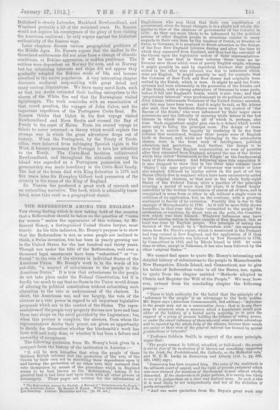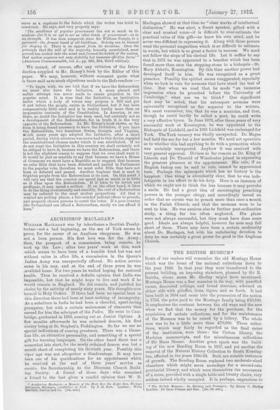THE REFERENDUM AMONG THE ENGLISH.* Tim strong feeling which is
now taking hold of the country that a Referendum should be taken on the question of "votes for women" makes the appearance of this volume, by Mr.
Samuel Honey, a distinguished United States lawyer, most timely. As his title indicates, Mr. Honey's purpose is to show that the Referendum is not, as some people are inclined to think, a Swiss invention, but has been in yearly growing use in the United States for the last hundred and thirty years. Though not under the title of the Referendum, well over a
thousand legal enactments have been " submitted " or " re- ferred " to the vote of the electors in individual States of the American -Union. Mr. Honey's work is, in the words of his sub-title, "a manual of submissions to the people in the
American States." It is true that submissions to the people do not take place under the Federal Constitution, but it is hardly too much to say that no State in the Union would dream of altering its political constitution without submitting such alteration to the veto or endorsement of the electors. In short, the Americans use, and use largely, the vote of the electors as a veto power in regard to all important legislative proposals which are in the control of the States. The repre- sentatives of the people very properly discuss new laws and beat them into shape on the anvil provided by the Legislature; but when this process is complete, the electors, from whom the representatives derive their power, are given an opportunity to decide for themselves whether the blacksmith's work has been well and truly done, or whether it has been a failure and unworthy of acceptance.
The following quotation from Mr. Honey's book gives in a compact form the history of the institution in America
"It will be seen hereafter that when the people of these thirteen British colonies lost the protection of the veto of the Crown by their own act in dissolving their dependence upon it and having the protection of no other veto they assumed that veto themselves by means of the procedure which in England seems to be best known as the 'Referendum,' taking it for granted that it had been cast upon them with all other powers of sovereignty. These pages are written for the information of * The Reforanclunt _Among the English: A Manua/ ofit" Sub_missione to the PdO_ple " in the American States. By Samuel IL Honey. W introduction by J. et. Loo Strachey. London: Macmillan and Co. [2s. ed. net.] Englishmen who may think that their own constitution of government, since its recent changes, is in a plight not wholly dfs-
similar to that of the charters of government of the Colonies in 1770. As they are more likely to be influenced by the political actions of other English people in situations similar in many respects to their own than by the conduct of Dutch, or Swedes, or Swiss, or Germans, it is proposed to direct attention to the doings of the four Now England colonies during and after the time at which they separated from England, and thus lost the restraint of the Crown upon the legislative action of their representatives. It will be seen that in those colonies there were no in- fluences save those which were of purely English origin, whereas it might possibly be said by superficial thinkers that political action in the 'other nine colonies was due to influences which were not English. It might possibly be said, for example, that
the Colonies of New York and New Jersey had originally been settled by the Dutch, which is true. It might be said the Penn- sylvania had been alternately in the possession of the Swedes and of the Dutch, with a strong admixture of Germans in some parts, before it fell into England's hands, which is also true ; and that 'proprietary interests' were predominant in its political action, as John Adams (afterwards President of the United States) asserted, and this may have been true. And it might be said, as Mr. Adams also said, that the Southern States were in the control of the Barons of the South,' who were influenced by their negro slave possessions and the difficulty of securing white labour in the hot climate in which they lived, all of which is, perhaps, also true. Such suggestions might give rise to a debate which would serve only to befog the principal issue. The design of these pages is to narrow the inquiry by confining it to the four colonies first mentioned, because their people were of English birth or descent, and, while not belonging to the aristocratic) classes, were in the front rank of intelligence, political education, and patriotism. And, further, the design is to show that these four English 'communities, as soon as possible after they separated from England, adopted the use of the device which they called 'Submission to the People' as the fundamental basis of their democracy. And following uporahis exposition it is also designed to show that in the other nine colonies (now States') the same principle of democracy was sooner or later also adopted, followed by similar action on the part of all the States (thirty-five in number) which have been successively added to the original thirteen, so that now in the whole forty-eight States of the Federal Union, after a practice of the principle covering a period of more than 130 years, it is found deeply embedded in the written Constitution of almost all of them, and is recognized in some form or other in all, without a single voice in criticism of its application, but, on the contrary, with a growing sentiment in favour of its extension. Possibly this is due to the example of Massachusetts in 1780. As it will be more fully shown hereafter, in that year this State submitted to the people' for ratification or rejection, by direct vote at the polls, the Constitu- tion which was then framed. Whatever influences may have impelled similar action in States outside of New England, this at least was done by English people. The principle of taking the decision of the people by a 'Referendum vote' (an expression taken from Mr. I3ryce's report, which is mentioned in the Preface) had long existed in New England, and the application of it tbue made by Massachusetts was followed by Now Hampshire in 1783, by Connecticut in 1818, and by Rhode Island in 1842. At some time or other, except in Delaware, it has also been followed by the other original States."'
We cannot find space to quote Mr. Honey's interesting and detailed history of submissions to the people in Massachusetts New Hampshire, Rhode Island, and Connecticut, nor to give his tables of Referendum votes in all the States, nor, again, to quote from the chapter entitled "Methods adopted to Obtain and Register the Will of the People." We may, how- ever, extract from his concluding chapter the following passage :—
"There is high authority for the belief that the principle of a 'reference to the people' is an advantage to the body politic. Ur. Bryce says (American Commonwealth, 3rd edition)'Reference to the people may act ete a conservative force : that is to say there may Ile occasions when a measure which a Legislature would pass either at the bidding of a heated party majority, or to gain the support of a group of persons holding the balance of voting power, or under the covert influence of those who seek some private advantage will be rejected by the whole body of the citizens, because their minds are cooler or their view of the general interest less biassed by special predilections or interests.'
"Professor Goldwin Smith, in support of the same principle, urges that
The people cannot be lobbied, wheedled, or bull-dozed : the people is not in fear of its re-election if it throws out something supported by the Irish, the Prohibitionist, the Catholic, or the Methodist vote and W. E. H. Leaky in Democracy and Liberty (vol. i., pp. 289, 290, 1890) says: Democracy has been crowned king. The voice of the multitude is the ultimate court of appeal, and the right of private judgment which was once claimed for members of Parliament is new almost &wily discarded. If the electorate is to judge policies, it is surely less likely to err (fit judges them on a clear and distinct issue. In such a case it is most likely to act independently and not at the dictation of party wirepullers.'
"And one more quotation from Mr. Bryee's great work may serve as a capstone to the fabric which the writer has tried to construct. Ho says, and very properly says:
The excellence of popular government lies not so much in its wisdom—for it is as apt to err as other kinds of government—as in its strength. It has been compared, since Sir William Temple, to a pyramid—the firmest based of all buildings. Nobody can be blamed for obeying it. There is no appeal from its decisions. Once the principle that the will of the majority, honestly ascertained, must prevail has soaked into the mind and formed the habits of the nation, that nation acquires not only stability but immense effective force.'" (American Commonwealth, vol. ii., pp. 263, 264, third edition).
We cannot, of course, offer any criticism of the Intro- duction supplied to Mr. Honey's book by the Editor of this paper. We may, however, without comment quote what is there said as to stock objections made to the Referendum :—
"To begin with, we are told that if we have the Referendum we must also have the Initiative. A more absurd and unfair attempt was never made to create prejudice in the popular mind. It is true that the Initiative, an institution under which a body of voters may propose a Bill and get it put before the people, exists in Switzerland, but it has been comparatively little used and is in reality hardly more than an inoperative curiosity of the Constitution. In America, in one State, no doubt the Initiative has been used, but certainly not as a development of the Referendum, for in truth it is the very upposite of the Referendum. As Mr. Honey's book shows, so far from it being found necessary to have the Initiative, if you have the Referendum, two American States, Georgia and Virginia, wIlich many years ago adopted the Initiative, after a short period, during which recourse was never had to this device, repealed the constitutional clauses under which it was established. If we do not want the Initiative in this country we shall certainly not be obliged to have it, because we have the Referendum, and there is not the slightest reason to suppose that we ever shall want it. It would be just as sensible to say that because we have a House of Commons we must have a Republic as to suggest that because we refer Bills that have • been debated and passed in Parliament to the popular vote, therefore we must refer Bills that have not been so debated and passed. Another bugbear that is used to frighten people from the Referendum is its cost. On this point I will only say that the country can spend just as much or as little as it likes upon the Referendum. If it likes to be lavish and profligate, it may spend a million. If, on the other hand, it likes to do the thing economically and sensibly, the cost of a Referendum may be reduced to the most modest proportions. All that is wanted are polling places, a fair-minded judicial officer to preside, and properly chosen persons to count the votes. If a poor country like Switzerland can afford a Referendum, surely we can afford it here."























































 Previous page
Previous page